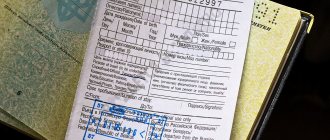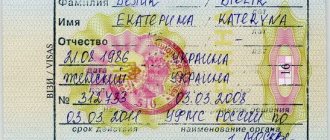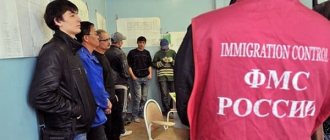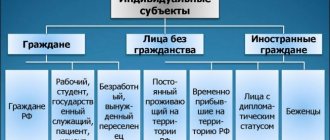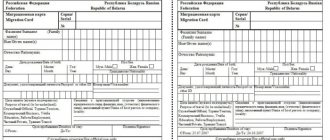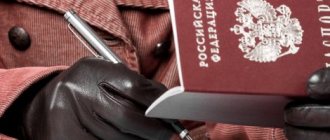Patent and Work Permit: Definition
In order to describe all the features and differences between the two types of granting the right to foreigners to work in Russia, first of all it is worth defining both of them.
So, according to regulatory documents developed by the state legislative bodies of Russia, a migration patent is a document confirming the right of an emigrant who arrived from a country with a visa-free regime to carry out labor activities in our country.
In turn, a work permit is a document giving the right to work to emigrants who arrived on the territory of the Russian Federation on the basis of a visa.
What is better: a work patent or a work permit reviews
Now there is a clear distinction between the categories of foreigners, depending on which they are required to obtain either a labor certificate or a work permit. This was discussed in the previous paragraphs of the article. Previously, when a migrant could choose what he needed to apply for to work in Russia, a patent was more popular among visitors.
Judging by the reviews, there were several explanations for this: firstly, it was much easier to get it; there were no legislative quotas), secondly, it had a lower cost, but for many this is important, since the majority of arriving citizens have very limited financial resources). The procedure for obtaining it was quite simplified. Being its owner, one could work for an entrepreneur, that is, an individual, which is what the majority of those who arrived did. Those wishing to work at the enterprise had to obtain a work permit.
Having read the reviews of citizens who received such a document, we can note the following: the cost of obtaining it is much higher, and it was not so easy to obtain a PnR: for many professions there are quotas for foreigners. But this was before innovations; now patent and RnR are essentially identical concepts. And obtaining one or another type of document depends on the country of which the foreign migrant is a citizen.
Obtaining the right to work on the basis of these two types of documents
From the definition of a patent it is clear that citizens of all countries with which Russia has a visa-free regime can obtain the right to work in this way. However, this is not entirely true, since for residents of the countries of the Customs Union, namely Belarus, Armenia, Kazakhstan and Kyrgyzstan, there is no need to obtain a patent. Thus, in order to obtain the right to work in our country, citizens of the following countries must apply for a migration patent:
- Ukraine;
- Uzbekistan;
- Azerbaijan;
- Abkhazia.
A work permit is required for employment of all “visa” emigrants. There are no exceptions here.
Important ! It should be noted that foreigners who have a residence permit or temporary residence permit do not need to obtain these documents, since they can work in Russia using their passports on an equal basis with Russians.
Innovations concerning migrant workers
Amendments made to Law No. 115-FZ on the legal status of foreigners in Russia concern the employment procedure for visitors from the CIS countries. Taking into account the innovations, the following procedure is emerging for legitimizing the work activities of foreign personnel with Russian employers:
- Citizens of other countries, permanently or temporarily residing in the Russian Federation, have the right to work on a common basis with Russians. Persons with refugee status, invited highly qualified specialists, diplomatic workers, students, athletes and other categories of citizens listed in Article 13 of Law No. 115-FZ are not required to have permits for employment.
- Workers from Belarus and Kazakhstan, according to an agreement between these states and the Russian Federation, can freely get a job without contacting the migration authorities.
- Foreigners who come from countries with which Russia has a visa regime can work in the Russian Federation only on the basis of a work permit obtained from the Federal Migration Service.
- “Visa-free” labor migrants need to apply for a patent.
Documents for obtaining a work permit and patent
When applying for both a patent and a work permit to the Main Directorate for Migration Affairs of the Ministry of Internal Affairs of Russia, you must provide a certain set of documents.
Important ! For each person confirming the right to work in Russia, this package is different.
The composition of the package of documents for a patent and for a work permit is presented in the table.
| Help for obtaining a patent | Help for obtaining a work permit |
| · application for a patent from a foreigner; · notarized and translated copy of the passport; · migration card, which indicates the purpose of departure - work. · additional medical insurance policy; · a document confirming the passage of a medical examination; · results of special tests in Russian language, history and social studies; · documents confirming the foreigner’s migration registration; · payment documents for payment of personal income tax for a patent; · photo 3x4; · Taxpayer Identification Number | · application for a work permit – 2 copies; · notarized and translated copy of the passport; · documents confirming the declared education; · results of special tests in Russian language, history and social studies; · receipt of payment of state duty in the amount of 3,500 rubles; · a document confirming the passage of a medical examination; · certificate of absence of HIV. |
Important ! In addition to the package of documents, foreigners must undergo a fingerprint examination.
What is a work permit and how is it different from a patent?
A work permit (WP) is supposed to be issued to labor migrants from states whose citizens are required to obtain a visa. In addition, it is expected that RnP will be obtained for residents of visa-free countries that are not included in the list of EAEU states or are not subject to patent employment. Thus, the main differences of a work permit include the following features:
The main procedural and bureaucratic burden for obtaining a work permit, unlike a patent, rests with the employer. It is he who submits the necessary documentation to the migration authorities, and the employee only provides the relevant documents to the employer.
The person preparing the RnR.- Obligation to obtain a visa. Regardless of whether there is a visa-free regime with the state from which a person wants to find a job in Russia, to work in the Russian Federation it is necessary to obtain a work visa.
- Availability of quotas. The state sets annual quotas for hiring foreign citizens. Such quotas are established separately for various sectors of activity and subjects of the federation.
- Obligation for the employer to obtain permission. An employer wishing to employ a foreigner from this category must apply for permission to do so. At the same time, he needs to register with the employment center and the migration department of the Ministry of Internal Affairs.
- Receipt deadline. The general time frame for obtaining a work permit differs significantly from obtaining a patent and is much longer.
- Target mechanisms. A work permit allows you to employ a specific employee at a specific enterprise, and does not allow this employee to work in other organizations.
These are just the main features that make the difference between a work permit and a patent. In general, work permits for foreigners in Russia have much more complex legal regulation and are discussed in more detail in a separate article.
Cost of patent and work permit
The cost of a patent and work permit in a PF is established by law. The payment method is also different: for the first case, this is the personal income tax rate for the patent for the number of expected months worked, and for the second option, the law provides for payment of a state fee.
In the first case, the amount of funds paid consists of the tariff rate, which is individual for each region, and depends on the number of paid months, and for the second, the amount is the same - 3.5 thousand rubles.
Procedure for the arrival of foreign workers in Russia
Residents of countries with which there is no visa-free entry agreement must contact the Russian embassy to obtain permission to visit the country. And if their goal is to find a job, then they need to apply for a work visa. Typically, such foreigners do not come at random, since hiring them requires the consent of the Federal Employment Service and a special permit.
The procedure for inviting a specialist from a “visa” country will fall on the shoulders of the employer. He will also need to pay a fee of 10 thousand for each hired specialist.
A foreigner can come to work in the Russian Federation only after obtaining a work permit. It will indicate the name of the employing company, specialty and region of future work. A change of employer will require a new permit.
Those who entered the territory of the Russian Federation without a visa need to obtain a patent to start working. Moreover, this can be done after entry. The main difference between a work patent and a work permit is that the former document does not indicate the employer. Having a patent in hand, a person can work both on the staff of a legal entity and for an individual entrepreneur.
You need to remember that employment will only be legal in the profession specified in the patent and in the delineated region. Violation of this clause will result in a fine of several hundred thousand rubles for the employer and administrative expulsion for the foreigner.
Procedure for obtaining a patent and work permit
For a patent, a foreign citizen without a visa must independently or with the help of an authorized representative apply to the authorized bodies of the Main Directorate for Migration Affairs of the Ministry of Internal Affairs of Russia within 30 calendar days from the date of entry into the country. When applying, you must make an advance payment for personal income tax and provide the above-mentioned list of documents. Next, go through a fingerprint examination and photographing procedure. After which the patent will be prepared and issued to the foreigner. The matter does not end there - certain obligations are imposed on the migrant: within the next two months after the issuance of the patent, he must find a job and conclude an employment contract, which is subsequently sent to the migration service.
To obtain a work permit for a foreign citizen, the employer must contact the migration service: the foreigner is only required to provide a package of documents.
What is a patent for and what is the benefit of it?
In accordance with Art. 1354 of the Civil Code of the Russian Federation, a patent for an invention, utility model or industrial design certifies the priority of the invention, utility model or industrial design, authorship and exclusive right to the invention, utility model or industrial design.
Thus, after receiving a patent, the patent holder will have an exclusive right, allowing him to permit or prohibit the use of the patent by other persons, as well as transfer this right, but only on the territory of the Russian Federation, since the patent has territorial effect. Accordingly, the RF patent will not be valid in other states, and can be freely used in their territories, provided that the same decision is not available for patent protection in those territories.
Thanks to a patent, during the entire period of validity of the document of protection, the patent holder will be able to exclude all possibilities of using the protected method, composition, device/system or appearance (depending on what object of intellectual property the patent was received for) by anyone other than the copyright holder without acquisition licenses. A patent, depending on the object of intellectual property, is issued for a period of 10 to 25 years, and upon expiration of these periods, the patent expires, the object becomes public domain, and any person can use the patented object without any restrictions.
The benefits of patents can be different, and the main point is, of course, protecting yourself and your intellectual property. You need to patent those technical solutions that you actually use or plan to use in the future. And if you are presented with a claim, then you, in turn, can always present your own patents in response, which will greatly complicate the life of those who have addressed you with a claim. Subsequently, they will have to either try to invalidate your patent, that is, prove that your patents were issued illegally, or convince the court that, despite having your own patents, you are using patents of third parties. The presence of a patent, as a result, leads to a significant reduction in the chances of a third party making claims against you. Thus, before you start patenting, you will no longer have the question: why do you need an application, and subsequently a patent?
At the same time, you don’t need to think that you only need to submit applications for something unique and revolutionary; you need to patent everything that, in your opinion, can be repeated and interesting, and if there is value in your development. Thus, even minor changes to an already known technical solution can become a source of profit for you.
The next significant point related to the benefits of patents is making a profit from trading exclusive rights to a particular object of intellectual property. Thanks to exclusive rights, you will be a monopolist in the area protected by a patent, and will also be able to produce and successfully sell competitive products, and, if desired, reduce or eliminate possible competitors, or provide them with the right to use your patent by concluding a license/sublicense agreement.
If you have received a patent, and there are no further plans to use this patent, then you have the opportunity to find a licensee interested in acquiring exclusive rights. In this case, the patent holder may submit to the federal executive authority for intellectual property an application for the possibility of granting any person the right to use the invention, utility model or industrial design (open license). In this case, the amount of the patent fee for maintaining a patent for an invention, utility model or industrial design in force is reduced by fifty percent starting from the year following the year of publication by the federal executive body for intellectual property of information about an open license (in accordance with paragraph 1 of Art. 1368). If you have a company that you plan to sell at a higher price, then having patents is a good additional bonus, because each patent increases the value of the company in the eyes of potential investors. It just so happens that investors are more interested in those startups whose intellectual property is protected by patents.
I would also like to draw attention to the following important point: after receiving a patent, you must actively use it. In accordance with clause 2 p. 1358 of the Civil Code of the Russian Federation, the use of an invention, utility model or industrial design is considered, in particular: importation into the territory of the Russian Federation, production, use, offer for sale, sale, other introduction into civil circulation or storage for these purposes of a product in which the invention or utility is used model, or product in which an industrial design is used. This will allow you to get maximum profit and avoid the following negative consequences.
If an invention or industrial design is not used or insufficiently used by the patent holder within four years from the date of issue of the patent, and a utility model - within three years from the date of issue of the patent, which leads to insufficient supply of the corresponding goods, works or services on the market, any person, whoever wants and is ready to use such an invention, utility model or industrial design, if the patent holder refuses to conclude a license agreement with this person on terms consistent with established practice, has the right to file a lawsuit against the patent holder for a compulsory simple (non-exclusive) license for use in the territory RF invention, utility model or industrial design (in accordance with clause 1 of Article 1362 of the Civil Code of the Russian Federation). A compulsory license is issued by a court decision and does not require the consent of the patent owner. The terms of use of the patent and the amount of remuneration to the patent holder are also determined by the court.
From the above described in this article, we can conclude that patents give the right to use inventions/utility models/industrial designs at one’s own discretion, as well as to make a profit from trading exclusive rights, and to receive additional benefits from the sale of licenses for patents. This is why you should protect your intellectual property by legal means.
Source: https://zuykov.com/ru/about/articles/2019/07/31/dlya-chego-nuzhen-patent-i-kakaya-ot-nego-polza/
Validity of patents and work permits and methods for their extension
A patent is issued to citizens of foreign countries for a period of 12 months, and its duration depends only on the amount of the advance payment for personal income tax, which must be paid monthly.
The validity period of a work permit is three years.
It should also be noted that a patent can be extended by contacting the authorized body 30 days before its expiration with an application and a list of documents, but extension is not provided for a work permit. The only way in this case is to completely re-register it.
What is IP registration under a patent?
Registration refers to the acquisition of a patent. Let us recall that a patent for individual entrepreneurs is one of the forms of taxation in the Russian Federation.
Everyone knows that for official employment and residence in Russia, foreign residents are required to obtain a patent. This document resembles a work permit, but there are still some differences between them.
A work permit gives the right exclusively to employment, and a patent combines the rights to employment and residence of a foreign resident in Russia for one calendar year.
People who want to get hired in the Russian Federation are required to apply for a patent, and people who decide to work for themselves, that is, become private entrepreneurs, must apply for an individual entrepreneur patent. The latest document allows you to run your own business in Russian cities and reside. According to the innovations, only citizens of CIS countries can obtain an individual entrepreneur patent.
In order to obtain a patent, a citizen of a foreign country should contact the tax service at the place of temporary or permanent registration. Let us remind you that temporary registration for residents of other countries is a mandatory condition. It is done within 7 days after entering the territory of the Russian Federation.
If temporary registration is not completed, then a fine of up to 2,500 rubles is imposed on the foreign citizen.
Website of the Main Directorate of Migration Affairs of the Ministry of Internal Affairs of the Russian Federation
In some cases, his stay in the country may be interpreted as illegal. Registration is carried out at the Main Directorate for Migration of the Ministry of Internal Affairs of Russia (the Main Directorate for Migration Issues of the Ministry of Internal Affairs of Russia). Previously, this organization was called the FMS (Federal Migration Service).
At the tax service department, a foreign resident will need to write an application in form F No. 26.5-1 . Within five days, the document is issued to the individual entrepreneur. If the declared type of activity falls into the list of available ones, then the person is issued a patent for a period of 1 year.
Sample patent application, page 1
Sample patent application, page 2
Sample patent application, page 3
It is worth remembering that a patent is issued strictly for the specified type of activity. It also has territorial boundaries of its action. Therefore, if a person moves, the document loses its validity.
Difference between patent and work permit
To summarize, I would like to note that the difference between a patent and a work permit lies not only in the category of citizens to whom the documents are intended, but also in the following points:
- A foreigner obtains a patent on his own, while a work permit is issued by the employer.
- The fee for the permit is fixed and independent - 3,500 rubles, and the personal income tax rate for a patent is set for each region separately and depends on the number of paid months.
- Document submission period: patent – from 1 to 12 months, and work permit – 3 years.
- The possibility of extension is provided only for a patent. The work permit needs to be renewed.
- Special package of documents.
Rate the quality of the article. We want to be better for you:
Patent duration
An individual entrepreneur patent is issued for a period of up to one calendar year. Example: if a person applied for a patent in September, then the document is valid from September to December, that is, 4 months. If a person wants to obtain a patent for a year, then it must be applied for at the beginning of the calendar year.
Features of the patent tax system
How to apply for a patent for a CIS citizen
Next, it is important to understand how to apply for a patent. To apply for a patent, you must submit this set of documents to the Federal Migration Service located in the constituent entity of the Russian Federation where your labor activity will be carried out within 30 days:
- application for a patent in the official form (see also a sample of filling out the application form);
- identification;
- document confirming registration;
- migration card indicating the purpose of entry “work”;
- 1 color photo measuring 3x4 cm.
- payment for a patent in the form of a personal income tax receipt in the form of an advance fixed payment for the previous period of implementation of the patent of labor activity
It is also necessary to undergo a medical examination, apply for a voluntary medical insurance policy, pass testing in the Russian language, history and fundamentals of Russian legislation (if there is no other document in hand confirming knowledge of the Russian language, Russian history and fundamentals of Russian legislation: a diploma or certificate issued in the USSR before September 1, 1991 or in the Russian Federation from September 1, 1991).
Migrants from CIS countries will be able to work in Russia on the basis of two types of patents
Foreigners who come to Russia under the “visa-free” regime may work here on the basis of patents rather than work permits. A group of State Duma deputies proposes to make such changes to the legislation. It is assumed that starting from January 1, 2015, “visa-free” labor migrants will be able to do not only household work, as now, but also any other work on the basis of patents. To do this, they will need to make an advance payment (personal income tax) of 1000 rubles. a month in advance, apply for a VHI policy and confirm your knowledge of the Russian language, as well as the history and fundamentals of Russian legislation.
“Visa-free” foreigners will need other documents for employment
According to current legislation, an employer or customer of work (services) can enter into employment and (or) civil contracts with “visa-free” foreigners if they have a work permit (clause 1 of article 13.1, clause 4 of article 13 of the Federal Law dated July 25, 2002 No. 115-FZ “On the legal status of foreign citizens in the Russian Federation”, hereinafter referred to as the Law). The only exceptions are foreigners who are hired in Russia to work for citizens to provide for their personal needs not related to business activities (clause 7 of article 1, clause 1 of article 9 of the Federal Law of May 19, 2010 No. 86-FZ “ On amendments to the Federal Law “On the Legal Status of Foreign Citizens in the Russian Federation” and certain legislative acts of the Russian Federation”, paragraph 1 of Article 13.3 of the Law). Such workers receive a patent, on the basis of which they carry out their work activities.
The bill proposes to revise the procedure for admitting foreigners arriving to Russia on a visa-free basis to work. Such migrants will have to obtain a patent instead of a work permit. It will be of two types: a patent for work in a company or for an individual entrepreneur (to perform work related to business activities) and a patent for work for an individual - an analogue of the current patent. It will be prohibited to employ foreigners who have an inappropriate type of patent (Clause 7, Article 13.3 of the Law as amended by the draft law). However, as well as attracting them to work outside the territory of the subject of the Russian Federation in which the patent was issued. This restriction is still in effect for both patents and work permits (Clause 8 of Article 13.3 of the Law).
This is interesting: How is vacation calculated after leaving maternity leave?
The duration of the patent and the procedure for its renewal will change slightly. Currently, patents are issued for a period of one to three months, with the possibility of multiple extensions for no more than a year. After a year, the foreigner must again apply to the migration service for the issuance of a new patent (Clause 5 of Article 13.3 of the Law). The bill provides for the issuance of a patent for a period of one month until the end of the employment or civil law contract, but also for no more than a year. However, a patent can be issued for the entire year, and according to the current procedure it is renewed every month or three months, depending on the period. True, to renew a patent for no more than 12 months, you do not need to go to the migration service; it is enough to pay an advance payment for personal income tax (clause 5 of Article 13.3 of the Law as amended by the draft law).
To obtain patents of both types, “visa-free” foreigners will need to contact the Russian Federal Migration Service within 30 calendar days from the date of entry into our country. If this deadline is violated, the migrant will be denied a patent. Let us note that now there is only one basis for refusal to issue a patent: the foreigner’s failure to provide any of the documents specified in the law.
The procedure for obtaining a patent will be similar to the procedure for obtaining a work permit. However, among the documents attached to the application for a patent, there will be a contract or VHI policy valid in Russia and a document confirming knowledge of the Russian language, knowledge of the history of Russia and the fundamentals of Russian legislation.
Organizations and entrepreneurs employing “visa-free” labor migrants, from January 1, 2015, if the bill is adopted, will need to check whether such workers have patents of the appropriate type.
For labor migrants who receive visas to arrive in Russia, as well as foreigners registered as individual entrepreneurs performing labor duties with the involvement of third parties, and some others, patents will not be issued, such categories of foreigners will have to obtain work permits in the usual manner ( Article 13 of the Law as amended by the draft law).
The Government of the Russian Federation and senior officials of the constituent entities of the Russian Federation will have the right to make decisions on suspending for a certain period or terminating the issuance of patents in the territory of a certain constituent entity of the Russian Federation. The heads of the constituent entities of the Russian Federation can also introduce a ban for organizations and entrepreneurs to employ “visa-free” labor migrants in certain types of economic activities (Clause 12 of Article 13.3 of the Law as amended by the draft law).
Working for a company will cost six times more
Instead of the current state fee for issuing a work permit with a maximum validity of one year, which is 2,000 rubles. (Subclause 24, Clause 1, Article 333.28 of the Tax Code of the Russian Federation), in order to obtain a patent, it will be necessary to pay personal income tax in the form of a fixed advance payment in the manner prescribed by law. The payment document will have to be attached to the application for a patent (subclause 4, clause 2, article 13.3 of the Law as amended by the draft law). Currently, in order to obtain a patent for work with citizens not related to business activities, “visa-free” foreigners submit a similar document (subclause 4, clause 2, article 13.3 of the Law).
As a result, an annual work patent related to the employer's business activities will cost a “visa-free” migrant six times more than the current annual work permit. While “visa” foreigners will still be able to pay a fee of 2,000 rubles. for an annual work permit.
It is also proposed to establish in the Law a requirement for the migration card of a “visa-free” labor migrant, which is included in the list of documents for issuing a patent. In the column “purpose of visit” he will be required to indicate the word “work”. But it will not be necessary to submit a civil law or employment contract to the Federal Migration Service of Russia to register a patent (subclause 3, clause 2, article 13.3 of the Law as amended by the draft law).
The developers of the bill propose to consider written appeals from citizens about possible violations of legislation in the field of migration within a shortened period of time - 20 rather than 30 days from the date of registration (Part 1, Article 12 of the Federal Law of May 2, 2006 No. 59-FZ "On the procedure for considering citizens' appeals Russian Federation" as amended by the draft law). Within five days from the date of registration, such an appeal must be sent to the authorized official with notification of this to the person who submitted the appeal.
An annual work patent related to the employer's business activities will cost a “visa-free” migrant six times more than the current annual work permit
According to the Agreement between the Government of the Republic of Belarus, the Government of the Republic of Kazakhstan, the Government of the Kyrgyz Republic, the Government of the Russian Federation and the Government of the Republic of Tajikistan on mutual visa-free travel of citizens 0 (ratified by Federal Law No. 114-FZ of 07.08.2001), citizens of countries participating in the Agreement have the right to enter and leave , transit, move and stay on the territory of the states of the Parties without visas using one of the valid documents, the list of which is indicated in the annex to the Agreement separately for each country. There are no reservations in this document that this Agreement does not apply to labor or business activities. A visa-free procedure is also provided for citizens of some other countries (letter of the Russian Ministry of Foreign Affairs dated April 27, 2012 No. 19261/kd). But it is worth considering that the visa regime is different for private trips and work activities.
This is interesting: What buildings need to be registered on a summer cottage
Labor patent in the Russian Federation for foreigners: essence, registration, receipt
- they are not subject to migration quotas;
- In Moscow and St. Petersburg, a patent is cheaper than purchasing a work permit from “intermediaries”;
- flexible patent payment system (from 1 to 3 months initially and up to 12 months extension).
With a foreign citizen who has received a patent, the following may be concluded:
- employment contract;
- civil contract.
The choice of contract type depends on the length of the period of employment of the foreign worker. If a foreign worker is needed to work at a dacha from May to September, or to build a garden house, then a contract agreement is preferable.

